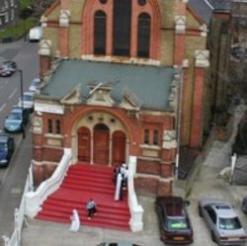A charity which faced closure when it couldn't pay a council debt as its bank account was frozen on account of not having properly appointed trustees, was saved by the interim manager appointed by the Charity Commission, the regulator's report reveals.
Over £600,000 of funds had been frozen in one of the Brotherhood of the Cross and Star's bank accounts for around seven years when Liverpool City Council took action against unpaid fees for maintenance work at one of the charity's two properties (bethels) in the city.
The charity had been operating for that time with two separate groups, each claiming they were responsible for the charity. Unable to identify who the real trustees were, the bank in charge of the bank account froze it, with a balance of £750,000. Despite this an individual associated with one of the groups (group A for the purpose of the Commission's report) had managed to withdraw £150,000. The bank then moved the remaining £600,000 into an account inaccessible to either group.
The Commission report advises that it was satisfied the £150,000 was not compromised, as the bank upon noticing the transaction had arranged with group A for this to be transfered to a solicitor acting for the group and and not accessed without approval by the bank or a court order.
Meanwhile Liverpool City Council had served notices on the charity over a number of years requiring essential maintenance work to be carried out on an unused and 'largely derelict' building owned by the charity in order to make it safe. These were ignored by the charity and the council eventually undertook the works itself, to the cost of £385,000 which was billed to the charity.
Despite having the funds, as they were tied in an inaccessible bank account, the charity could not pay the debt, and the City Council sought to wind up the charity through court process.
The Commission first became aware that the Brotherhood of the Cross and Stars, a religious charity with roots in Nigeria, was not appropriately governed in 2001 when it received complaints about alleged misappropriation of funds abroad, and an internal dispute between two groups each believing themselves to be the council of management.
After a statutory investigation by the Commission which closed in May 2002, it found the allegations of misappropriation to be false, but decided the charity did not have an appropriate governing body and advised that the two groups seek mediation to resolve their differences. However this was not undertaken.
The second statutory investigation by the Commission, which completes today with the publication of the Commission's report, was opened in January 2009, four months after the Commission became aware of the possible winding up of the charity. Group B had requested that the Commission open a statutory investigation and appoint an interim manager, but the Commission had hoped in that period to help the two groups appoint interim trustees to conduct an independent election of a new trustee board. However the groups could not reach agreement on how to do this and as per the request of Group B, the interim manager, Philip Watts of Anthony Collins Solicitors LLP, was appointed on 21 January 2009 when the Commission opened its inquiry. His term ran from 28 January 2009 to 2 March 2010.
The interim manager results
Watts was given all the powers of a trustee and took control of the charity's assets and funds. Within two weeks of his appointment he had settled the debt with the City Council after gaining access to the frozen funds, successfully preventing the winding up order, which was set to go to court that same day (9 February 2009).
The Commission said during his time at the charity Watts had managed to save the charity from winding up, regularise the charity's banking arrangements, which had previously involved two banks and over 15 bank accounts, returned the £150,000 taken from the frozen bank account by one of the individuals from Group A so that it could be used for charitable purposes, and appointed a 20-strong trustee board.
He had also arranged for the sale of the property which had resulted in the charity's debt, securing £31,000 for the property from the council for the freehold for the grade II listed building and ensuring the council paid the £2,000 plus vat legal fees in relation to the transaction.
The interim managers fees came to £44,287.13 with disbursement payments of £1,261.90. These were paid by the charity when Watts was discharged.
Current governance
The charity is now under the control of a board of 20 trustees, all of which were from group B of the charity.
A spokesperson for the Commission advised: "Individuals associated with both groups were invited to participate in the election process, undertaken in accordance with the charity's governing document.
"However, all of the 20 appointed trustees were associated with group B."
The charity, which was set up in March 1976, now does not operate in Liverpool, with its other property having been sold in 2009. It retains a bethel (place of worship) in London and one in Manchester, both of which it has owned throughout the Commission investigations.
Announcing it was now satisfied that the charity could proceed with its charitable purposes, the Commission advised that the situation raised important points for the wider sector.
"An internal conflict is a serious disagreement within a charity, which left unresolved, can lead to a breakdown in the effective governance and day-to-day management of a charity," reads the report.
"In internal conflict situations we expect those involved to have exhausted all other means of resolving conflict before approaching the Commission. A dispute can be especially destructive when the issue centres on who are the valid trustees of the charity and it is often the case that because governance has fallen into disarray there are no validly appointed trustees."








